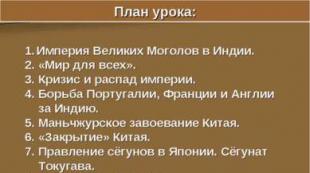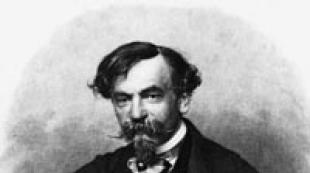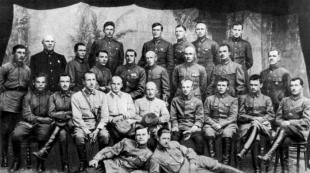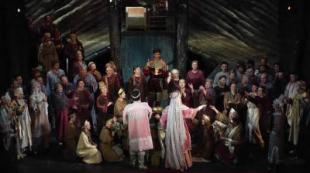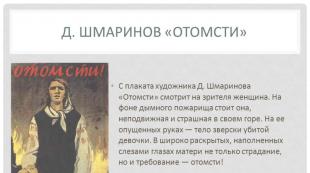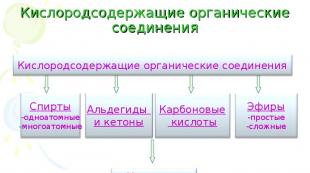Saratov State Technical University Chernyshevsky. Saratov State University named after N.G. Chernyshevsky (SSU). College of Management and Service
License series A No. 227581, reg. No. 8062 dated December 21, 2006
Certificate of state accreditation series AA No. 000450, reg. No. 0431 dated December 22, 2006
Saratov State University named after N.G. Chernyshevsky (Imperial Nikolaevsky), opened in 1909, is one of the oldest and leading scientific and educational centers in Russia.
SSU has significant research and innovation potential, plays a system-forming role in the socio-economic and cultural development of the region (one of the main developers and implementers of the High Technology Development Program in the Saratov Region), is widely involved in the international educational and scientific space (has cooperation agreements with 56 foreign universities in Europe, Asia and America).
The structure of SSU includes 13 faculties, 5 educational institutes, a branch in Balashov with nine faculties and 3 colleges. The educational and research process at the university is provided by 175 departments, including 10 basic ones.
Training is carried out in 83 specialties of higher professional education, 23 - secondary vocational education, 56 - postgraduate studies, 10 - doctoral studies, 28 areas of bachelor's and master's degrees, 45 programs of additional professional education, 40 - vocational training.
A special feature of the SSU development program is the training of specialists with deep research and innovation competencies based on fundamental interdisciplinary education.
Training at the university of specialists capable of solving research and technological problems in the relevant areas will lead to a significant increase in the competitiveness of regional innovative businesses and will accelerate innovative processes in high-tech industries and the economy as a whole.
Institutes:
- Balashov Institute
- Institute of Archeology and Cultural Heritage
- Institute of Additional Professional Education
- Institute of History and International Relations
- Institute of Philology and Journalism
- Institute of Chemistry
- Interregional Institute of Social Sciences
- Research Institute of Natural Sciences
- Research Institute of Social Sciences
- Scientific and Educational Institute of Optics and Biophotonics
- Educational and Scientific Institute of Nanostructures and Biosystems
- Pedagogical Institute of SSU
- Risk Institute
- Department of Biology
- Faculty of Geography
- Faculty of Geology
- Faculty of Sociology
- Faculty of Mechanics and Mathematics
- Faculty of Computer Science and Information Technology
- Faculty of Nano- and Biomedical Technologies
- Faculty of Nonlinear Processes
- Psychology faculty
- Faculty of Physics
- Faculty of Philosophy
- Faculty of Economics
- Faculty of Law
- Faculty of Foreign Languages
- Faculty of Arts and Art Education
- Faculty of Correctional Pedagogy and Special Psychology
- Faculty of Pedagogy, Psychology and Primary Education
- Faculty of Russian Literature
- Faculty of Physical Education
- Faculty of Education
- Faculty of Biology and Ecology
- Faculty of Foreign Languages
- Faculty of Physics and Mathematics
- Faculty of Social Work
- Psychology faculty
- Faculty of Physical Culture and Life Safety
- Faculty of Philology
- Faculty of Economics
Few graduates can confidently name the university where they want to study. But almost everyone can describe it. This should be a university where you can study at the expense of the state budget, where you can gain enough knowledge to become a successful specialist, and where you will have a vibrant extracurricular life. Saratov named after N.G. Chernyshevsky fits all these criteria.
History of the university
The university is one of the oldest in Russia. It was created back in 1909. At that time, only doctors were trained within its walls. In 1917, new faculties were added. Since then, children who are interested in physics and mathematics, as well as those who are interested in the Faculty of History and Philology, began studying there. In the same year, the university began training lawyers.
In 1922, it became clear that the agronomy department had grown too large. Therefore, it separated from the university and became a separate educational institution. A little later, the Faculty of Medicine suffered the same fate.
In 1923 the name was changed. It turned into Saratov N.G. Chernyshevsky. We still know the university by this name.
The university attracted a large number of gifted applicants, many of whom later became famous people. In addition, people worked within these walls who, thanks to the material base of the educational institution, made discoveries.
Currently, the name of N. G. Chernyshevsky is very popular. Here students receive education in a variety of areas. The choice is so rich that every second applicant submits documents here.
Institutes
Saratov Chernyshevsky University offers applicants 5 educational institutes and 13 operating faculties. In addition, there is a branch in Balashov.
Among educational institutes, the Interregional Institute of Social Sciences occupies a worthy place. It is closely connected with other educational institutions in the country.

Research institutes of natural sciences, optics and biophtonics, as well as nanostructures and biosystems are of great importance for the development of modern science. It is impossible to imagine the future without their work. And for studying human society, a social science research institute is important.
There are also a number of institutes that are not educational. They are famous throughout the city. School graduates prepare in advance to submit documents there.
The Institute of Archeology and Cultural Heritage is popular. The work of its graduates is surrounded by an aura of romance. After all, experts revive the past and tell our contemporaries about how their ancestors lived. But this is not their only task. Specialists also do everything to preserve cultural heritage.
It is very promising to study at the Institute of History and International Relations. It is impossible to imagine one without the other. Every translator and specialist working with representatives of other cultures should know the history of relations between their home country and other countries. This is the secret of a true professional.
Lovers of the Russian language apply to the Institute of Philology and Journalism. Graduates will be able to find work in various fields. They are in demand in newspapers, magazines, television, and publishing houses. In addition, you can become a teacher and pass on your knowledge to future generations.

Anyone interested in the world around them will be able to gain knowledge at the Institute of Chemistry. Studying here is not easy, but very interesting.
And those who want to devote their lives to working with children, learn to understand the psychology of the younger generation and pass on their knowledge to them, will be able to become successful and get a job they love after studying at the SSU Pedagogical Institute.
The institution of risks is also worth special attention. It is a little less popular than the others, but also provides a lot of knowledge.
In addition, Saratov State University named after N. G. Chernyshevsky offers to gain knowledge at the Institute of Additional Professional Education.
Faculties
Saratov Chernyshevsky University provides a wide range of specialties. The faculties available here will be of interest to both lovers of exact sciences and humanists.
For those who want to study nature and humans, the Faculty of Biology is suitable. This is where knowledge will be given that will then allow you to work in different areas.
Fans of adventure novels and travel films will be interested in the Faculty of Geography. Its graduates will have very interesting and educational work that they will not get tired of even after years.
The work of graduates of the Faculty of Geology is no less romantic. They will have to travel a lot to increase the wealth of their native country.
Those who want to work with people and know the mentality of modern society will definitely like the Faculty of Sociology. Studying here is very exciting.
And for those who cannot imagine their life without calculations, who have given their hearts to the exact sciences, the Faculty of Mechanics and Mathematics is suitable. Studying here is not easy, but graduates will always be able to find a job in their specialty.

The Faculty of Computer Science and Information Technology is becoming increasingly popular. It is impossible to imagine the modern world without these specialists. Not only do they know how to handle technology, but they can also create something new.
Graduates of nano- and biomedical technologies will also be involved in creating new things. They will have to look for cures for diseases to make humanity healthier.
Studying at the Faculty of Nonlinear Processes will also be challenging, but exciting. You will need to prepare to enter this faculty several years before leaving school.
Those who want to get to know a person and his way of thinking should pay attention to Psychologists are extremely in demand in the labor market.
Also, those who like to study man and his life will like the Faculty of Philosophy. Here you will learn to think and draw the right conclusions.
But the physics department will help you find out why everything happens this way and not otherwise. Students will be asked to solve a large number of interesting mysteries invented by nature.
Economics and law faculties have been very popular for several years. It is worth considering that the competition here is always great.
Saratov Pedagogical Institute named after. Chernyshevsky
Those who want to work with children and pass on their knowledge and experience to them enter the pedagogical school. It is here that future teachers of foreign languages, physical education, Russian language and literature receive their education.
In addition, here you can get a profession as a primary school teacher, a child psychologist and a specialist in working with special children.
Studying at a pedagogical institute is very interesting. And its graduates will always be in demand in the labor market.

Dormitory
Students who have chosen the Chernyshevsky Saratov Institute for themselves are very often forced to look for a room or apartment to live during their studies. Not everyone can take them off. But don't worry because the university offers hostel rooms to its students.
However, it is worth considering that a large number of nonresident students study at the university, so there may not be enough places for everyone. Therefore, you need to apply for a place in the dormitory in advance.
higher education institution, the oldest higher education institution in the city of Saratov. Founded in 1909.History of University

Saratov State University was founded on June 10, 1909, thanks to the persistence of the Saratov public, the administration and Prime Minister P. A. Stolypin. The university was opened as Nikolaev University. The grand opening took place on December 6 with the consent of Emperor Nicholas II to give the university his name. On the same day, after a prayer service and religious procession, a stone was laid at the site of construction of future university buildings. Karl Ludwigovich Mufke will be involved as an architect for their construction. In just a few years he will be able to create a complete ensemble with high quality performance.
Vasily Ivanovich Razumovsky became the first rector of Nikolaev Saratov University. Initially, the university had only one faculty - medicine. In 1917, the faculties of physics, mathematics and law were created. Semyon Ludwigovich Frank became the dean of the Faculty of History and Philology. P.K. Galler worked at the university. In the first post-revolutionary years, N.I. Vavilov worked at the Faculty of Agronomy.
Fundamental and applied scientific research and innovative activities at Saratov State University are provided by research and educational institutions, centers, laboratories, museums, innovation and implementation structures. Among them: the Educational and Scientific Institute of Nanostructures and Biosystems, the Research Institute of Natural Sciences, the Institute of Archeology and Cultural Heritage, the Botanical Garden, the regional center for computer technologies in industry, a technology park, three technology transfer centers, centers for collective use, and a business incubator.
SSU is one of three universities in the country that has structures for implementing projects under the most prestigious grants from the Ministry of Education and Science of the Russian Federation and major foundations (Carnegie Corporation, MacArthur Foundation, CRDF ) in the field of development of both the humanities (MION - Interregional Institute of Social Sciences) and natural sciences (REC - Scientific and Educational Center "Nonlinear Dynamics and Biophysics"). Both of these interdisciplinary structures were formed as a result of victories in relevant competitions and are among the best in Russia. Saratov State University implements a continuous cycle of training: pre-university training – secondary vocational education – higher vocational education – postgraduate education – advanced training and retraining of specialists. There are 26,342 undergraduate and 590 graduate students studying at SSU. Training is carried out in 82 specialties of higher professional education, 21 - secondary vocational education, 61 - postgraduate studies, 5 - doctoral studies, 28 bachelor's and 13 master's degrees, 15 programs of additional professional education, 26 - professional training. As a rule, new specialties at SSU were opened on the initiative and with the support of regional partners (the specialty "Computer Security" - with the participation of the FSB department, the specialty "Nanotechnologies in Electronics" - of large enterprises of the electronics industry, the specialty "Chemical Technology of Natural Energy Carriers and Carbon Materials" - chemical and oil refining enterprises, specialty “Protection in emergency situations” - Main Directorate of the Ministry of Emergency Situations of Russia for the Saratov region, etc.). In general, SSU implements basic educational programs in 19 enlarged (out of 28 existing) groups of specialties, preparing specialists for educational and scientific institutions, enterprises and organizations in high-tech sectors of the economy and social sphere. At the same time, SSU is the only university in the Saratov region that provides training in pedagogical specialties. In addition to training personnel, SSU is engaged in subsequent improvement of their qualifications at its Institute of Further Professional Education. The powerful scientific and educational potential and well-functioning organization of the sphere of additional professional education at SSU served as the basis for the Ministry of Education and Science of the Russian Federation to include the university among the institutions organizing advanced training for scientific and pedagogical workers of Russian universities. Only in 2007–2010. 635 teachers from 142 universities located in 66 cities of the Russian Federation, from Murmansk to Yuzhno-Sakhalinsk, improved their qualifications at SSU. 142 universities are about half of the total number of universities currently under the jurisdiction of the Ministry of Education and Science of the Russian Federation. University specialists also provide advanced training for civil servants of the Prosecutor's Office of the Russian Federation.
Since 2002, SSU has been participating in the ACM ICPC World Programming Championship. In 2013, the university won 5 silver medals, two gold medals, the title of European champions in 2002 and the title of world champions in 2006.
In 2010, SSU became a national research university.
SSU is one of the twenty best universities in the country (in 2011 it took 13-14th place).
Faculties
University Institutes
- Institute of Archeology and Cultural Heritage
- Institute of Additional Professional Education
- Art Institute
- (former Faculty of History)
- Risk Institute
- Institute of Physical Culture and Sports
- (former Faculty of Philology and Journalism)
- Institute of Chemistry (formerly Faculty of Chemistry)
- Interregional Institute of Social Sciences
- Research Institute of Natural Sciences
- Research Institute of Mechanics and Physics
- Research Institute of Social Sciences
- Scientific and Educational Institute of Optics and Biophotonics
- Educational and Scientific Institute of Nanostructures and Biosystems
- United Institute of Micro- and Nanoelectronics
- Institute of Electronic and Distance Learning
Pedagogical Institute of SSU
Included in SSU in 1997, it was represented by six faculties:
- Russian literature;
- pedagogy, psychology and primary education;
- foreign languages;
- arts and arts education;
- correctional pedagogy and special psychology;
- physical education
In 2011, the Pedagogical Institute as a structural unit of the university ceased to exist. Faculties have been reorganized.
Includes the following faculties:
- mathematics, economics and computer science;
- philological;
- biology and ecology;
- foreign languages;
- psychology;
- social work;
- physical culture and life safety;
- pedagogical.
College of Radio Electronics named after P. N. Yablochkov
- instrument making;
- radio-electronic;
- mechanical engineering
College of Management and Service
Specialties:
- Tourism
- Advertising
- Economics and Accounting
- Insurance business
- Management
- Hotel service
- Land and property relations
Geological College
Includes the following departments:
- economic and legal
- geodetic
- oil
University libraries
- Saratov Zonal Scientific Library named after V. A. Artisevich
- Library of the Balashov Institute (branch)
- Educational library of the College of Radio Electronics named after. P. N. Yablochkova
- Geological College Educational Library
The director of the SSU library from 1931 for 67 years (!) was V. A. Artisevich.
House temple
In 2009, construction of the Orthodox Church of Saints Cyril and Methodius Equal to the Apostles began on the campus, which will replace the previously lost house church (chapel). In 2014, construction of the temple was completed.
Famous graduates
Gallery
see also
- Astronomical Observatory of Saratov State University
Write a review on the article "Saratov State University named after N. G. Chernyshevsky"
Notes
|
||||||||||||||||||||||||||
An excerpt characterizing Saratov State University named after N. G. Chernyshevsky
“More, please, more,” Natasha said through the door as soon as the balalaika fell silent. Mitka set it up and again brilliantly rattled Barynya with busts and interceptions. Uncle sat and listened, tilting his head to the side with a barely noticeable smile. The Lady's motive was repeated a hundred times. The balalaika was tuned several times and the same sounds rattled again, and the listeners did not get bored, but only wanted to hear this game again and again. Anisya Fedorovna entered and leaned her corpulent body against the ceiling.“Please listen,” she said to Natasha, with a smile extremely similar to her uncle’s smile. “He plays well for us,” she said.
“He’s doing something wrong in this knee,” the uncle suddenly said with an energetic gesture. - Here we need to scatter - it’s a pure matter of march - scatter...
- Do you really know how? – Natasha asked. – Uncle smiled without answering.
- Look, Anisyushka, are the strings intact on the guitar? I haven’t picked it up for a long time - it’s pure marching! abandoned.
Anisya Fedorovna willingly went with her light tread to carry out her master’s instructions and brought a guitar.
The uncle blew off the dust without looking at anyone, tapped the lid of the guitar with his bony fingers, tuned it and adjusted himself in the chair. He took (with a somewhat theatrical gesture, placing the elbow of his left hand) the guitar above the neck and, winking at Anisya Fedorovna, began not the Lady, but struck one sonorous, clean chord, and measuredly, calmly, but firmly began to finish the famous song at a very quiet pace: Po li and ice pavement. At the same time, in time with that sedate joy (the same one that Anisya Fedorovna’s whole being breathed), the motive of the song began to sing in the souls of Nikolai and Natasha. Anisya Fedorovna blushed and, covering herself with a handkerchief, left the room laughing. Uncle continued to finish the song cleanly, diligently and energetically, looking with a changed, inspired look at the place from which Anisya Fedorovna had left. There was just a little something laughing in his face on one side, under his gray mustache, and he laughed especially when the song progressed further, the beat quickened, and something came off in places where it was too loud.
- Lovely, lovely, uncle; more, more,” Natasha screamed as soon as he finished. She jumped up from her seat, hugged her uncle and kissed him. - Nikolenka, Nikolenka! - she said, looking back at her brother and as if asking him: what is this?
Nikolai also really liked his uncle’s playing. The uncle played the song a second time. The smiling face of Anisya Feodorovna appeared again at the door and from behind her there were still other faces... “Behind the cold key, she shouts: girl, wait!” Uncle played, made another deft move, tore it off and moved his shoulders.
“Well, well, my dear, uncle,” Natasha moaned in such a pleading voice, as if her life depended on it. The uncle stood up and it was as if there were two people in him - one of them smiled seriously at the merry fellow, and the merry fellow made a naive and neat prank before the dance.
- Well, niece! - the uncle shouted, waving his hand towards Natasha, tearing off the chord.
Natasha threw off the scarf that was draped over her, ran ahead of her uncle and, putting her hands on her hips, made a movement with her shoulders and stood.
Where, how, when did this countess, raised by a French emigrant, suck into herself from that Russian air that she breathed, this spirit, where did she get these techniques that pas de chale should have long ago been supplanted? But these spirits and techniques were the same, inimitable, unstudied, Russian ones that her uncle expected from her. As soon as she stood up and smiled solemnly, proudly and slyly with gaiety, the first fear that gripped Nikolai and everyone present, the fear that she would do the wrong thing, passed and they were already admiring her.
She did the same thing and did it so precisely, so completely accurately that Anisya Fedorovna, who immediately handed her the scarf she needed for her business, burst into tears through laughter, looking at this thin, graceful, so alien to her, well-bred countess in silk and velvet. , who knew how to understand everything that was in Anisya, and in Anisya’s father, and in her aunt, and in her mother, and in every Russian person.
“Well, the countess is a pure march,” the uncle said, laughing joyfully, having finished the dance. - Oh yes niece! If only you could choose a good guy for your hubby, it’s pure business!
“It’s already been chosen,” Nikolai said, smiling.
- ABOUT? - the uncle said in surprise, looking questioningly at Natasha. Natasha nodded her head affirmatively with a happy smile.
- What a great one! - she said. But as soon as she said this, another, new system of thoughts and feelings arose in her. What did Nikolai’s smile mean when he said: “already chosen”? Is he happy about this or not? He seems to think that my Bolkonsky would not approve, would not understand this joy of ours. No, he would understand everything. Where is he now? Natasha thought and her face suddenly became serious. But this only lasted for one second. “Don’t think, don’t dare think about it,” she said to herself and, smiling, sat down next to her uncle again, asking him to play something else.
Uncle played another song and a waltz; then, after a pause, he cleared his throat and sang his favorite hunting song.
Like powder since the evening
It turned out well...
Uncle sang as the people sing, with that complete and naive conviction that in a song all the meaning lies only in the words, that the melody comes by itself and that there is no separate melody, and that a melody is only for the purpose. Because of this, this unconscious melody, like the melody of a bird, was unusually good for my uncle. Natasha was delighted with her uncle's singing. She decided that she would no longer study the harp, but would only play the guitar. She asked her uncle for a guitar and immediately found the chords for the song.
At ten o'clock a line, a droshky and three horsemen sent to look for them arrived for Natasha and Petya. The Count and Countess did not know where they were and were very worried, as the messenger said.
Petya was taken down and placed like a dead body in a line; Natasha and Nikolai got into the droshky. Uncle wrapped Natasha up and said goodbye to her with completely new tenderness. He escorted them on foot to the bridge, which had to be forded, and ordered the hunters to go ahead with lanterns.
“Farewell, dear niece,” his voice shouted from the darkness, not the one that Natasha knew before, but the one that sang: “Like powder since evening.”
The village we were passing through had red lights and a cheerful smell of smoke.
- What a charm this uncle is! - Natasha said when they drove out onto the main road.
“Yes,” said Nikolai. - Are you cold?
- No, I’m great, great. “I feel so good,” Natasha even said with bewilderment. They were silent for a long time.
The night was dark and damp. The horses were not visible; you could only hear them splashing through the invisible mud.
What was going on in this childish, receptive soul, which so greedily caught and assimilated all the varied impressions of life? How did it all fit into her? But she was very happy. Already approaching the house, she suddenly began to sing the tune of the song: “Like powder since the evening,” a tune that she had been catching all the way and finally caught.
- Did you catch it? - said Nikolai.
- What were you thinking about now, Nikolenka? – Natasha asked. “They loved asking each other that.”
- I? - Nikolai said, remembering; - you see, at first I thought that Rugai, the red male, looked like his uncle and that if he were a man, he would still keep his uncle with him, if not for the race, then for the frets, he would have kept everything. How nice he is, uncle! Is not it? - Well, what about you?
- I? Wait, wait. Yes, at first I thought that we were driving and we thought that we were going home, and God knows where we were going in this darkness and suddenly we would arrive and see that we were not in Otradny, but in a magical kingdom. And then I also thought... No, nothing more.
“I know, I thought about him correctly,” Nikolai said, smiling, as Natasha recognized by the sound of his voice.
“No,” Natasha answered, although at the same time she really was thinking about Prince Andrei, and about how he would like his uncle. “And I keep repeating, I repeat all the way: how well Anisyushka performed, well...” said Natasha. And Nikolai heard her ringing, causeless, happy laughter.
“You know,” she suddenly said, “I know that I will never be as happy and calm as I am now.”
“This is nonsense, nonsense, lies,” said Nikolai and thought: “What a charm this Natasha is! I don’t have and never will have such another friend. Why should she get married, everyone would go with her!”
“What a charm this Nikolai is!” thought Natasha. - A! there’s still a fire in the living room,” she said, pointing to the windows of the house, which shone beautifully in the wet, velvety darkness of the night.
Count Ilya Andreich resigned from the leadership because this position was associated with too much expense. But things didn’t improve for him. Often Natasha and Nikolai saw secret, restless negotiations between their parents and heard talk about the sale of a rich, ancestral Rostov house and a house near Moscow. Without a leader there was no need to have such a large reception, and Otradnensky life was conducted more quietly than in previous years; but the huge house and outbuildings were still full of people, and more people still sat down at the table. All these were people who had settled into the house, almost members of the family, or those who, it seemed, had to live in the count’s house. These were Dimmler - a musician with his wife, Yogel - a dance teacher with his family, the old lady Belova, who lived in the house, and many others: Petya's teachers, the young ladies' former governess and simply people who were better or more profitable to live with the count than at home. There was not such a big visit as before, but the course of life was the same, without which the count and countess could not imagine life. There was the same hunting, even increased by Nikolai, the same 50 horses and 15 coachmen in the stable, the same expensive gifts on name day, and ceremonial dinners for the entire district; the same count whists and bostons, for which he, throwing out cards to everyone, allowed himself to be beaten by hundreds every day by his neighbors, who looked at the right to form Count Ilya Andreich’s game as the most profitable lease.
The Count, as if in a huge snare, walked about his affairs, trying not to believe that he was entangled and with each step becoming more and more entangled and feeling unable either to break the nets that entangled him or to carefully, patiently begin to unravel them. The Countess felt with a loving heart that her children were going bankrupt, that the Count was not to blame, that he could not be different from what he was, that he himself was suffering (although he hid it) from the consciousness of his own and his children’s ruin, and she was looking for means to help the cause. From her female point of view, there was only one remedy - Nikolai's marriage to a rich bride. She felt that this was the last hope, and that if Nikolai refused the match that she had found for him, she would have to say goodbye forever to the opportunity to improve matters. This party was Julie Karagina, the daughter of a beautiful, virtuous mother and father, known to the Rostovs from childhood, and now a rich bride on the occasion of the death of the last of her brothers.
The Countess wrote directly to Karagina in Moscow, proposing her daughter's marriage to her son, and received a favorable response from her. Karagina replied that she, for her part, agreed that everything would depend on her daughter’s inclination. Karagina invited Nikolai to come to Moscow.
Several times, with tears in her eyes, the countess told her son that now that both of her daughters were settled, her only desire was to see him married. She said that she would have gone to bed calm if that had been the case. Then she said that she had a beautiful girl in mind and asked his opinion about marriage.
In other conversations, she praised Julie and advised Nikolai to go to Moscow for the holidays to have fun. Nikolai guessed where his mother’s conversations were heading, and in one of these conversations he called her to complete frankness. She told him that all hope of improving matters was now based on his marriage to Karagina.
- Well, if I loved a girl without a fortune, would you really demand, maman, that I sacrifice my feelings and honor for the fortune? - he asked his mother, not understanding the cruelty of his question and only wanting to show his nobility.
“No, you didn’t understand me,” said the mother, not knowing how to justify herself. “You didn’t understand me, Nikolinka.” “I wish your happiness,” she added and felt that she was telling a lie, that she was confused. - She cried.
“Mama, don’t cry, just tell me that you want this, and you know that I will give my whole life, everything, so that you can be calm,” said Nikolai. I will sacrifice everything for you, even my feelings.
But that’s not how the countess wanted to pose the question: she didn’t want a sacrifice from her son, she herself would like to sacrifice to him.
“No, you didn’t understand me, we won’t talk,” she said, wiping away her tears.
“Yes, maybe I love the poor girl,” Nikolai said to himself, well, should I sacrifice my feelings and honor for my fortune? I’m surprised how my mother could tell me this. Because Sonya is poor, I cannot love her, he thought, “I cannot respond to her faithful, devoted love. And I’ll probably be happier with her than with some Julie doll. I can always sacrifice my feelings for the good of my family, he told himself, but I cannot command my feelings. If I love Sonya, then my feeling is stronger and higher than anything else for me.”
Nikolai did not go to Moscow, the countess did not resume conversation with him about marriage, and with sadness, and sometimes even embitterment, she saw signs of greater and greater rapprochement between her son and the dowryless Sonya. She reproached herself for this, but could not help but grumble and find fault with Sonya, often stopping her for no reason, calling her “you” and “my dear.” Most of all, the good countess was angry with Sonya because this poor, dark-eyed niece was so meek, so kind, so devotedly grateful to her benefactors, and so faithfully, invariably, selflessly in love with Nicholas, that it was impossible to reproach her for anything. .
Nikolai spent his vacation with his relatives. A fourth letter was received from Prince Andrei's fiancé, from Rome, in which he wrote that he would have long been on his way to Russia if his wound had not unexpectedly opened in a warm climate, which forces him to postpone his departure until the beginning of next year . Natasha was just as in love with her fiancé, just as calmed by this love and just as receptive to all the joys of life; but at the end of the fourth month of separation from him, moments of sadness began to come over her, against which she could not fight. She felt sorry for herself, it was a pity that she had wasted all this time for nothing, for no one, during which she felt so capable of loving and being loved.
It was sad in the Rostovs' house.
Christmastide came, and besides the ceremonial mass, except for the solemn and boring congratulations of neighbors and courtyards, except for everyone wearing new dresses, there was nothing special to commemorate Christmastide, and in the windless 20-degree frost, in the bright blinding sun during the day and in the starry winter light at night, I felt the need for some kind of commemoration of this time.
On the third day of the holiday, after lunch, all the household went to their rooms. It was the most boring time of the day. Nikolai, who went to see his neighbors in the morning, fell asleep in the sofa. The old count was resting in his office. Sonya was sitting at the round table in the living room, sketching a pattern. The Countess was laying out the cards. Nastasya Ivanovna the jester with a sad face was sitting at the window with two old women. Natasha entered the room, walked up to Sonya, looked at what she was doing, then walked up to her mother and stopped silently.
- Why are you walking around like a homeless person? - her mother told her. - What do you want?
“I need it... now, this very minute, I need it,” said Natasha, her eyes sparkling and not smiling. – The Countess raised her head and looked intently at her daughter.
- Don't look at me. Mom, don't look, I'm going to cry now.
“Sit down, sit with me,” said the countess.
- Mom, I need it. Why am I disappearing like this, mom?...” Her voice broke off, tears flowed from her eyes, and in order to hide them, she quickly turned and left the room. She went into the sofa room, stood, thought, and went to the girls' room. There, the old maid was grumbling at a young girl who had come running out of breath from the cold from the yard.
“He will play something,” said the old woman. - For all the time.
“Let her in, Kondratievna,” said Natasha. - Go, Mavrusha, go.
And letting go of Mavrusha, Natasha went through the hall to the hallway. An old man and two young footmen were playing cards. They interrupted the game and stood up as the young lady entered. “What should I do with them?” thought Natasha. - Yes, Nikita, please go... where should I send him? - Yes, go to the yard and please bring the rooster; yes, and you, Misha, bring some oats.
- Would you like some oats? – Misha said cheerfully and willingly.
“Go, go quickly,” the old man confirmed.
- Fyodor, get me some chalk.
Passing by the buffet, she ordered the samovar to be served, although it was not the right time.
The barman Fok was the most angry person in the whole house. Natasha loved to try her power over him. He didn't believe her and went to ask if it was true?
- This young lady! - said Foka, feigning a frown at Natasha.
No one in the house sent away as many people and gave them as much work as Natasha. She could not see people indifferently, so as not to send them somewhere. She seemed to be trying to see if one of them would get angry or pout with her, but people didn’t like to carry out anyone’s orders as much as Natasha’s. “What should I do? Where should I go? Natasha thought, walking slowly down the corridor.
- Nastasya Ivanovna, what will be born from me? - she asked the jester, who was walking towards her in his short coat.
“You give rise to fleas, dragonflies, and blacksmiths,” answered the jester.
- My God, my God, it’s all the same. Oh, where should I go? What should I do with myself? “And she quickly, stamping her feet, ran up the stairs to Vogel, who lived with his wife on the top floor. Vogel had two governesses sitting at his place, and there were plates of raisins, walnuts and almonds on the table. The governesses were talking about where it was cheaper to live, in Moscow or Odessa. Natasha sat down, listened to their conversation with a serious, thoughtful face, and stood up. “The island of Madagascar,” she said. “Ma da gas kar,” she repeated each syllable clearly and, without answering m me Schoss’s questions about what she was saying, left the room. Petya, her brother, was also upstairs: he and his uncle were arranging fireworks, which they intended to set off at night. - Peter! Petka! - she shouted to him, - take me down. s - Petya ran up to her and offered her his back. She jumped on him, clasping his neck with her arms, and he jumped and ran with her. “No, no, it’s the island of Madagascar,” she said and, jumping off, went down.
As if having walked around her kingdom, tested her power and made sure that everyone was submissive, but that it was still boring, Natasha went into the hall, took the guitar, sat down in a dark corner behind the cabinet and began plucking the strings in the bass, making a phrase that she remembered from one opera heard in St. Petersburg together with Prince Andrei. For outside listeners, something came out of her guitar that had no meaning, but in her imagination, because of these sounds, a whole series of memories were resurrected. She sat behind the cupboard, her eyes fixed on the strip of light falling from the pantry door, listened to herself and remembered. She was in a state of memory.
Sonya walked across the hall to the buffet with a glass. Natasha looked at her, at the crack in the pantry door, and it seemed to her that she remembered that light was falling through the crack from the pantry door and that Sonya walked through with a glass. “Yes, and it was exactly the same,” thought Natasha. - Sonya, what is this? – Natasha shouted, fingering the thick string.
The history of the institute begins in 1918, when a pedagogical institute was created on the basis of a two-year teacher's institute that existed in Saratov since 1913. For many years it existed as an independent university or as a university department. Based on the order of the People's Commissariat of Education of the RSFSR dated November 24, 1931, the institute was separated from Saratov University. The institute had departments (later they became faculties): physics and mathematics, chemical biology, Russian language and literature, history, economics, Kalmyk, Mordovian. Later they were added: German, pedagogical, pedological, preschool and Ukrainian. At the beginning of the 40s there were 5 faculties: history, Russian language and literature, foreign languages, physics and mathematics, natural sciences.
In 1957, the Faculty of Physical Education was opened, in 1959 - the Faculty of Music and Pedagogy, in 1978 - the Faculty of Primary Schools, in 1979 - the Faculty of Advanced Training and Professional Retraining, in 1989 - the Faculty of History was recreated, in 1990 g. - the defectology faculty was opened.
At the Faculty of Russian Language and Literature from 1966 to 1993. there was an Uzbek department that trained Russian language teachers for Uzbek schools; a department for Russian Germans was opened at the Faculty of Foreign Languages in 1991; Since 1993, the Faculty of Primary Schools has had a preschool department.
Prominent scientists and teachers worked at the Pedagogical Institute: professors A.P. SKAFTYMOV, A.M. LUKYANENKO, E.I. Pokusaev, L.I. BARANNIKOVA (philological faculty); Professor G.P. BOEV, V.T. MIRONOV, Yu.A. SKLYAROV, I.F. KOVALEV (Faculty of Physics and Mathematics), Professor A.P. POBEDONOSTSEV, A.I. CHERKESOV, V.G. MICHURIN (Faculty of Natural Sciences), Professor I.V. STRAKHOV (Department of Psychology), Professor A.F. OSTALTSEVA and A.I. OZOLIN (history department), professor L.G. ARCHAZHNIKOVA (Music and Pedagogical Faculty).
Among the graduates of the institute are outstanding teachers, cultural figures and athletes, musicians and singers: winner of the international competition in Italy B. ARON, soloists M. SHKINEV (Sverdlovsk Musical Comedy Theater) and A. ZHURAVLEV (Opera Theater in Cheboksary); athletes: Champion of the Olympic Games, World and Europe SISIKIN Y., two-time World Champion GALKINA L., European champions TIMOFEEVA Y., LOMTEV E.
The students of the institute were Heroes of the Soviet Union V.G. STALLIONS. and a graduate of the history department V.F. SHCHADIN
University structure, list of faculties
Currently, the Pedagogical Institute is a structural unit SSU.
It consists of 6 faculties: the Faculty of Russian Literature, the Faculty of Foreign Languages, the Faculty of Primary Schools, the Faculty of Correctional Pedagogy and Special Psychology, the Faculty of Music and Pedagogy and the Faculty of Physical Education. All faculties, except the Faculty of Foreign Languages, have correspondence departments where teachers and public education workers receive higher education.
The departments of the institute employ 280 teachers, including 12 doctors of science, professors, 140 candidates of science, associate professors.
The institute is headed by the director, Doctor of Historical Sciences, Professor Igor Rudolfovich Pleve.
Deputy directors: for academic work - associate professor, candidate of physical and mathematical sciences P.M. Zinoviev, for scientific work - professor, doctor of philological sciences A.A. Demchenko, in the correspondence department - associate professor, candidate of pedagogical sciences N.G. Trushkina, in educational and social work - associate professor, candidate of pedagogical sciences V.A. Ishchenko.
The institute has four academic buildings and three student dormitories. Each academic building has a library and reading room, and in the dormitories there are rooms for independent study and relaxation.
The institute's library has been given scientific status. It has extensive collections of pedagogical, psychological and other specialized literature, as well as periodicals and fiction.
During the year, the institute runs preparatory courses - evening, correspondence, which prepare for admission to all faculties. In the summer, after finishing school final exams, applicants can take short-term courses that provide training according to an intensive program. The courses will help you better prepare for entrance exams and successfully pass the competition. Those who prepare for exams on their own can purchase programs and teaching aids from the courses.
List of specialties, exams
The faculties of the institute train in the following specialties:
| FACULTIES: | |
| Faculty of Russian Literature | |
| Speciality Russian language and literature (full-time, part-time) |
|
| Faculty of Foreign Languages | |
| Speciality - foreign language: English (+ German) - English (+ French) - German (+ English) - German language and literature - German language (+ pedagogy and methods of primary education) - French (+ English) - French (+ German) - third foreign language (commercial evening for students of the faculty) |
|
| Faculty of Primary Schools | |
| Speciality - pedagogy and methodology of primary education (full-time, part-time) (+ foreign language (full-time)), (+ computer science (full-time, part-time)) - preschool pedagogy and psychology (commercial day, commercial extramural) - social pedagogy (+ computer science (commercial extramural course)) - Informatics |
|
| Faculty of Correctional Pedagogy and Special Psychology | |
| Speciality - oligophrenopedagogy (full-time, part-time) specializations: - practical psychology - methods of teaching the Russian language in schools for children with intellectual disabilities - speech therapy work with children with intellectual disabilities |
|
| Faculty of Music and Pedagogy | |
| Speciality - music education (full-time, part-time) (+ cultural studies (full-time)), (+ pedagogy and methods of primary education (full-time)) - art history (commercial part-time) |
|
| Faculty of Physical Culture | |
| Speciality - physical education (full-time, part-time) |
|
Medalists are interviewed.
Contest: on average 2.5 people per place.
Exams: for specialties: 1) - Russian language (p), Russian language and literature (y), history of Russia (y); 2) - foreign language (u, p), Russian language (p); 3) - Russian language (p), Russian language and literature (u), mathematics (p); 3.1. mathematics (p), mathematics (u), Russian language (p), 4) - biology (u), Russian language (p), Russian language and literature (u); 5) - singing and solfeggio, instrument, Russian language (p); 6) - gymnastics, athletics, Russian language (p), biology (u).
Note: (e) - daytime; (h)-correspondence; (c) - evening; (j)-commercial form of training; (u)-oral, (n)-written form of passing exams.
The dormitory is provided to full-time students.
Acceptance of documents, conducting entrance exams and enrollment in the institute is carried out in accordance with the admission rules, which are approved no later than June 1.
Documents are accepted for part-time studies from April 20 to May 31, and for full-time studies - from June 25 to July 15.
Entrance exams for full-time students are held from July 16 to 31, and for part-time students from June 1 to 10.
Faculty telephone numbers:
Russian literature 24-95-51;
foreign languages 24-95-17;
